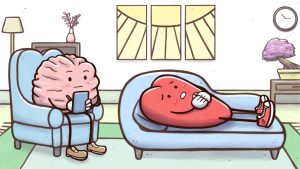There’s definitely a connection between the heart and mind, and in this Healthy Matters episode I’ve brought together two of the best minds to talk about the relationship between our mental health and physical health. Dr. Eduardo Colon chairs our Psychiatry Department and Dr. Steven Goldsmith is a cardiologist and nationally recognized expert in heart failure.
“You can die from a broken heart,” said Dr. Steven Goldsmith. “Fortunately, most of the time this is diagnosed in the context of other significant physical illnesses, such as an acute episode of lung disease, exacerbation or pancreatitis – but it can definitely occur.”
So where does the mental health connection come from? (Spoiler alert: it’s related to that thing between your shoulders.)
“When I was a kid, I borrowed a book that was called ‘The Body has a Head,’” said Dr. Colon. “It’s something I that I think about pretty often, because when we have this discussion about your emotions or your psychological wellbeing, people think about the mind, and we tend to forget that we have this incredible organ in our body – our brain – that’s connected to every other organ and regulates a lot of function.”
Dr. Colon shared what he learned about a guy who’s written a paper on “voodoo death,” (yes, it’s as creepy as it sounds) as well as how the need for mental health care has grown dramatically in recent years due to the pandemic.
“The isolation that we’ve all experienced, and certainly the narrowing down of the level of activity. I sometimes say that we were stuck on Groundhog’s Day in terms of the routines: fear of getting ill, the acknowledgment of the impact of the pandemic and people around you in your sense of vulnerability.” Dr. Colon also acknowledged that there has been a loss of sobriety for people with substance use disorders, and he’s seen people who have been struggling with preexisting mental health illnesses such as depression. These of course can lead to other concerns.
“Physical or mental stress can cause a form of heart disease called stress cardiomyopathy,” explains Dr. Goldsmith. “And what that means is that the heart suddenly – for no other reason – seems to not work very well, and it’s usually not fatal. It’s usually reversible, but you can die from it.”
The convergence of stress, inflammation, hormones and even genetics can create just the right conditions for heart failure. But there are ways to reduce some of these risk factors, and the doctors offered a few great suggestions including yoga, meditation and mindfulness – something that I mention I may need to practice, too.
We round out the episode with a couple of questions from listeners: one who’s experiencing heartache and another who’s concerned about his family’s history of heart issues. Healthy Matters of the heart that matter to you on Episode Five – enjoy!

